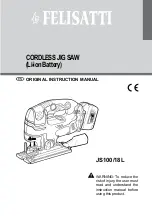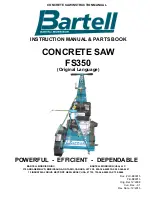
-7-
1. Blade movement
In the Model CJ 18DSL, the orbital mechanism moves the blade up-and-down and forward-and-backward.
The amount of fore-and-aft blade movement can be adjusted just by turning the change knob to any of the
four settings. The following table shows the modeled orbits of blade movement at each orbital position
(change knob position).
2. Orbital position selection
Selection of the most appropriate orbital position for each cutting job is essential to achieve the best
efficiency for cutting. However, as the best orbital position depends on such factors as hardness and
thickness of the workpiece, desired finish of the cut surface and so on, it is not practical to set a single,
simple standard for best orbital position selection. Table 1 can be used as a general guide for appropriate
orbital position selection based on various factors.
Table 1 General guide for appropriate orbital position selection
Orbital position
Factor
III II I 0
Material hardness
Soft material
Hard material
Material thickness
Thick
Thin
Cutting speed
Faster cutting
Slower cutting
Straight cutting or
curved cutting
Straight cutting
Curved cutting
Surface finishing
Rough finish acceptable
(splintering, chipping acceptable)
Fine finishing
Material stability
Unstable
Very stable
ORBITAL MECHANISM AND BLADE











































